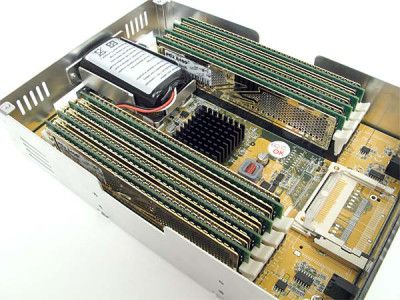From our front-page news:
Fast storage, can we ever get enough? With the introduction of the solid-state disk, it's become so clear to us all just how much of a bottleneck traditional mechanic storage has become. Our CPUs are getting faster, but with even faster storage, we could see substantial gains in certain areas that would make it feel like we doubled the speed of our machine. I for one cannot wait for SSDs to come down in price even further and increase in density. When we all have one in our own machine, it will be a good day.
But with SSD hogging the limelight lately, what about other solutions? Remember the Gigabyte i-RAM? Essentially, it was also a solid-state disk, but much larger than what we are used to today. ACard is one company that didn't want the idea to die though, as they've released a similar part that takes advantage of DDR2, up to 64GB worth (via 8GB sticks).
Our friends at Tech Report have a look at the new device, and to say the results are drool-worthy would be a slight understatement. In many tests, it actually out-performs Intel's ultra-fast X25-E, but, it does cost more, so in some regards, it scales. The other downside is the density. DDR2 might be inexpensive now, but the device can only fit 16GB worth of 2GB modules, and going higher really isn't worth it since higher-density modules escalate in price fast. Still, this is a great idea and it's cool to see another option on the market for those who are interested.

Another benefit DRAM has over flash memory is that there's no limit on the number of write-erase cycles it can endure. Effective wear leveling algorithms and single-level cell memory can greatly improve the lifespan of a flash drive, but they just prolong the inevitable. DRAM's resiliency does come with a cost, though. While flash memory cells retain their data when the power is cut, DRAM is volatile, so it does not. To keep DRAM data intact, you have to keep the chips juiced.
Source: Tech Report
But with SSD hogging the limelight lately, what about other solutions? Remember the Gigabyte i-RAM? Essentially, it was also a solid-state disk, but much larger than what we are used to today. ACard is one company that didn't want the idea to die though, as they've released a similar part that takes advantage of DDR2, up to 64GB worth (via 8GB sticks).
Our friends at Tech Report have a look at the new device, and to say the results are drool-worthy would be a slight understatement. In many tests, it actually out-performs Intel's ultra-fast X25-E, but, it does cost more, so in some regards, it scales. The other downside is the density. DDR2 might be inexpensive now, but the device can only fit 16GB worth of 2GB modules, and going higher really isn't worth it since higher-density modules escalate in price fast. Still, this is a great idea and it's cool to see another option on the market for those who are interested.

Another benefit DRAM has over flash memory is that there's no limit on the number of write-erase cycles it can endure. Effective wear leveling algorithms and single-level cell memory can greatly improve the lifespan of a flash drive, but they just prolong the inevitable. DRAM's resiliency does come with a cost, though. While flash memory cells retain their data when the power is cut, DRAM is volatile, so it does not. To keep DRAM data intact, you have to keep the chips juiced.
Source: Tech Report
